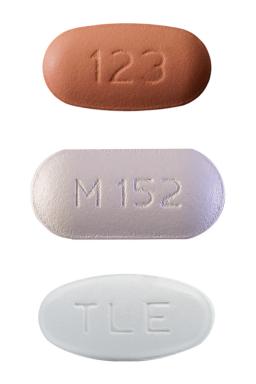Atripla / Symfi / Symfi Lo
SEE GENERIC NAMES BELOW

Standard Dose
One tablet once daily on an empty stomach, preferably at bedtime.Atripla is for adults and children 12 years of age and older weighing at least 88 pounds (40 kg). Symfi Lo is for adults and pediatric patients weighing at least 77 pounds (35 kg) and Symfi is for those who are at least 88 pounds (40 kg).
Take missed dose as soon as possible, unless it is closer to the time of your next dose. Do not double up on your next dose. Should not be used in people with moderate or severe kidney or liver impairment.
Atripla
600 mg efavirenz, 200 mg emtricitabine, 300 mg tenofovir DF
EFV (NNRTI), FTC and TDF (two NRTIs)
Symfi
600 mg efavirenz, 300 mg lamivudine, 300 mg tenofovir DF
EFV (NNRTI), 3TC and TDF (two NRTIs)
Symfi Lo
400 mg efavirenz, 300 mg lamivudine, 300 mg tenofovir DF
EFV (NNRTI), 3TC and TDF (two NRTIs)
- See the individual drugs contained in Atripla: Sustiva and Truvada.
- See the individual drugs contained in Symfi and Symfi Lo: Sustiva, Epivir, and Viread.
- See package insert for more complete information on potential side effects and interactions.
- Generic Atripla is available.
Manufacturer
Bristol-Myers Squibbbms.com; atripla.com
(800) 321-1335
Gilead Sciences, Inc.
gilead.com; (800) GILEAD-5 (445–3235)
Mylan
symfi.com; symfi-lo.com
mylan.com
(877) 446-3679
AWP
Atripla: $3,593.66/monthGeneric is available.
Symfi: $2,201.46/month
Symfi Lo: $2,201.46/month
Potential Side Effects and Toxicity
Use with caution in individuals with depression or other psychiatric issues who are not receiving mental health care. People should be screened for depression and suicidality. Dizziness, drowsiness, abnormal or vivid dreams, difficulty concentrating, rash, diarrhea, nausea, fatigue, headache, or insomnia may go away after a few weeks. TDF is associated with long-term decreases in bone mineral density. Prior to initiation, kidney function and hepatitis B status should be assessed (monitor liver enzymes closely in people with co-infection). Initiation of HBV therapy may be warranted upon discontinuation. Call your health care provider right away if you develop any of the following signs or symptoms of hepatitis: yellowing of the skin or whites of the eyes; dark or tea-colored urine; pale-colored bowel movements; nausea or vomiting; loss of appetite; or pain, aching, or tenderness on the right side below the ribs. Late-onset neurotoxicity, including ataxia and encephalopathy (impaired consciousness, confusion, psychomotor slowing, psychosis and delirium), may occur months to years after beginning EFV. A link between efavirenz and birth defects in humans has not been supported in meta-analyses. The recommendation is that women in their first trimester continue taking efavirenz as long as their viral load remains undetectable; however, efavirenz should only be used if the potential benefit outweighs the potential risk (as when other treatment options are not available). It is recommended to screen for antenatal and postpartum depression in recently pregnant people. Efavirenz can cause a false positive result for marijuana on certain drug tests. A confirmatory test can be done.
Potential Drug Interactions
Avoid taking with drugs that negatively affect the kidneys, including chronic use or high doses of anti-inflammatory drugs for pain such as aspirin, ibuprofen and naproxen. Should not be taken with voriconazole, ergot derivatives, midazolam, pimozide, triazolam, bepridil or St. John’s wort, or medications that prolong QTc interval (these abnormal heart rhythms can make the heart stop) or with a risk for torsades de pointes. It is recommended to add 200 mg Sustiva (800 mg total) when taking rifampin for people weighing at least 110 pounds. May affect warfarin levels. Can decrease levels of buprenorphine and methadone—monitor for withdrawal. When taken with carbamazepine, phenobarbital or phenytoin, periodic monitoring of anticonvulsant and efavirenz levels should be done or alternative anti-seizure drugs considered. Effectiveness of birth control pills may be decreased. Closer monitoring and dose adjustments may be required with posaconazole (avoid unless benefit outweighs potential risk) and itraconazole. Monitor clarithromycin effectiveness or consider azithromycin. Monitor immunosuppressant level when starting or stopping. Cardizem, Lipitor, Pravachol and Zocor may need to be adjusted. Titrate bupropion and sertraline based on clinical response. Use caution with Harvoni; monitor renal function closely. Should not be taken with Epclusa or Zepatier. Tell your provider or pharmacist about all medications, herbals, and supplements you are taking or thinking of taking, prescribed or not, as there are other drug interactions not listed here.
More Information
Check with your provider or pharmacist first before stopping these drugs, so that you avoid the rapid development of HIV resistance to efavirenz. A genetic trait affecting efavirenz metabolism, causing a higher rate of side effects, occurs more in African Americans. NNRTIs are not recommended for HIV-2, usually found outside the U.S., as it is resistant to NNRTIs. If you can’t sleep, ask your doctor about gradually adjusting the timing of your dose until it’s taken during the day. Pregnant individuals can voluntarily enroll in the Antiretroviral Pregnancy Registry through their provider; go to apregistry.com.
Doctor Comments
Dr. Melanie Thompson:
Atripla, the first once-daily complete HIV regimen, has not been recommended for initial therapy in the U.S. for a number of years, largely due to the many side effects associated with efavirenz. Central nervous system side effects include depression, dizziness, sleepiness, abnormal dreams, headache and, most notably, suicidality. Others include rash, elevation of LDL cholesterol and EKG changes that could be associated with serious heart rhythm abnormalities (QTc prolongation). Efavirenz also has many drug-drug interactions that complicate its use. Efavirenz-containing generics Symfi and Symfi Lo both use 3TC instead of FTC. Symfi Lo contains only 400 mg of efavirenz and may have fewer side effects. The IMPAACT 2010 study found that infants exposed to efavirenz in pregnancy were more likely to experience growth stunting than those exposed to dolutegravir.
Activist Comments
Activist Joey Wynn:
The gold standard for many years, Atripla fell out of favor due to CNS side effects as well as a host of other complications and contraindications. I’m not sure why anyone would get on this treatment as a new start, but there is still a small minority of folks staying on it until they have a reason to start shopping for a new combination. Every dog has its day, and this one is doggone. Symfi and Symfi Lo are “branded generic” versions of Atripla. Same issues apply, although the greatly reduced cost makes this have some minor role in some limited “budget constrained” markets; but still definitely not on a first-line selection by any means.


